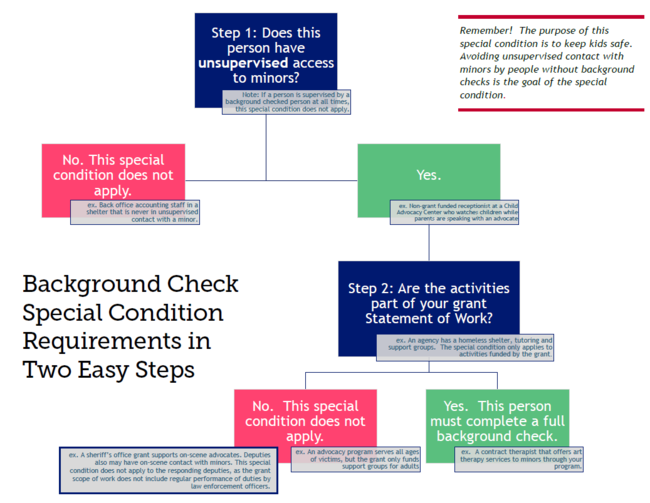Background Check FAQs for CVS Grantees
Grantees must ensure that staff and volunteers are suitable to interact with participating minors prior to allowing any contact with minors. This page answers some frequently asked questions about the suitability determination. This page does not include all requirements and must be used in conjunction with the DCJ Guidelines for Determination of Suitability for Individuals who Interact with Participating Minors.
- Who is considered a Participating Minor?
-
All individuals under 18 years of age served in the Statement of Work included in your Grant Agreement. This includes all activities under the award, including those activities associated with matching funds, program income or project-related volunteer activities.
- How do I define “interaction”?
-
Interaction includes all forms of contact (verbal, written, physical, etc.). "Interaction" does not include brief contact that is both unexpected by the grantee and unintentional on the part of the individual (i.e. when a postal carrier delivers mail to an administrative office).
- My agency provides services to minors, but my DCJ grant is for adult contact only. Does this requirement apply?
-
No. However, you must adhere to other federal, state, tribal, or local law, and/or by your agency’s written policies and procedures.
For example: Your agency offers support groups to adults and to children who are sexually assaulted. Your grant only supports the adult support groups. While it is best practice to ensure anyone who is ever in contact with minors has a comprehensive background check, this special condition does not apply.
- Do I need to determine suitability for individuals who are not paid with grant funds?
-
Possibly. If the individual interacts with a minor receiving services described in the grant statement of work, this special condition will apply, regardless of whether they are funded by the grant or not. This might be an employee but also might be a consultant, contractor, volunteer, intern, front desk staff, etc. who does work described in the grant, but might not be paid with grant funds.
However, if an individual does work unrelated to the grant statement of work, this special condition does not apply.
For example: Your agency offers shelter services to adults and children as a deliverable of the grant. This special condition does apply to the volunteers who work under that program, even though those volunteers are not paid for their time.
For example: Your agency offers art therapy services to children as a deliverable of the grant. Some of the contracted art therapists are paid by the grant and some are contractors and paid by another funding source. This special condition does apply to all the contractors who work on that program, even though some of those contractors are not paid by the grant.
For example: Your law enforcement agency has a grant that supports advocates responding on-scene to victims of crime. The agency has determined suitability for all of the advocates who respond to victims on-scene. In addition to your advocates, the responding officers also may have contact with minors on-scene. This special condition does not apply to the responding officers. The scope of work of the grant does not include regular performance of duties by law enforcement officers.
- What does Personally-Accompanied Contact mean?
-
Infrequent or occasional contact by an individual with a minor in the presence of an individual that has been deemed suitable.
For example: Your agency has determined suitability for all individuals who may have contact with participating minors, but there is a last minute change of personnel to a person who has not yet been deemed suitable. This is OK, as long as:
- Your agency has written policies and procedures to address this type of situation, AND
- The new person is closely and personally accompanied, and remains continuously within view and earshot of an individual that has already been deemed suitable.
- What information do I need to gather?
-
See the official DCJ guidance document and view the video for additional information.
- How do I determine suitability?
-
See the official DCJ guidance document and view the Background Checks training video for additional information.
- How do I document that I have Determined Suitability for award activities?
-
The grantee must document in writing that, based on the information gathered, the individual is suitable to interact with minors and this documentation is included in your grant file. This documentation and applicable policies will be reviewed during compliance monitoring.
Here is an example form that may help document suitability.
- Can I use grant funds to pay for the associated costs of Determining Suitability?
-
Yes. You may use indirect costs charged to the grant, or pay for it as a direct cost only if approved by your DCJ Grant Manager in advance of spending the funds. Please contact your DCJ Grant Manager if you are unsure if your approved budget includes these costs.
- How do I know if the special condition applies to us?
-
Our compliance monitors have created a Background Check Special Condition Flowchart to help you identify if the special condition applies to you or not.
- I have employees moving from other states, are there any resources for me to do Sex Offender Registry Checks in other states?
-
Yes, the FBI has a website with links to Sex Offender Registries by state.
- If I still have questions, who do I contact?
-
Contact our office at cvsgrants@state.co.us

